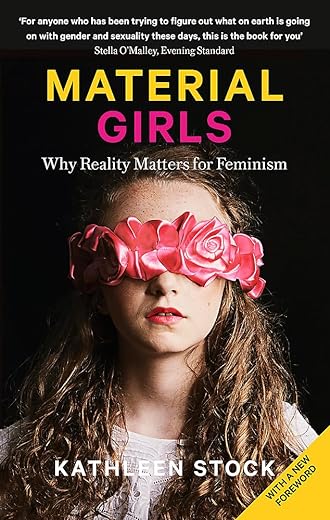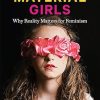Material Girls: Why Reality Matters for Feminism
£5.70£10.40 (-45%)
‘A clear, concise, easy-to-read account of the issues between sex, gender and feminism . . . an important book’ Evening Standard
‘A call for cool heads at a time of great heat and a vital reminder that revolutions don’t always end well’ Sunday Times
Material Girls is a timely and trenchant critique of the influential theory that we all have an inner feeling known as a gender identity, and that this feeling is more socially significant than our biological sex.
Professor Kathleen Stock surveys the philosophical ideas that led to this point, and closely interrogates each one, from De Beauvoir’s statement that, ‘One is not born, but rather becomes a woman’ (an assertion she contends has been misinterpreted and repurposed), to Judith Butler’s claim that language creates biological reality, rather than describing it. She looks at biological sex in a range of important contexts, including women-only spaces and resources, healthcare, epidemiology, political organization and data collection.
Material Girls makes a clear, humane and feminist case for our retaining the ability to discuss reality, and concludes with a positive vision for the future, in which trans rights activists and feminists can collaborate to achieve some of their political aims.
Read more
Additional information
| Publisher | Fleet (7 April 2022) |
|---|---|
| Language | English |
| Paperback | 320 pages |
| ISBN-10 | 0349726620 |
| ISBN-13 | 978-0349726625 |
| Dimensions | 12.7 x 2.1 x 19.69 cm |




by graham
I read the book because of a news article about your Oxford U speech and to understand better. You use a lot of ‘big’ and a lot of new words – which is a joy, but i’m trying to work towards a ‘bullet point’ understanding.
I get the point about feminism to the subject. I would characterise my understanding from your book as ‘Equality’ but still circumstances where Women/Girls/Trans should be treated differently.
High points – 98% male or female physically on 3 counts and usually recognised. Orientation is a given and accepted – adults can have love/sex/babies with who they chose. % Hetero/Homo/Bi figures useful.
% of people who dont go through physical/hormone transition useful. Agree with your book ref safe spaces and sport. I disagree generally on self id and children physically transitioning – although I emphasise why they want to. Characteristic for treating Trans differently should be male puberty and hormones IMHO . I cant help thinking ‘gender’ is emperors new clothes – Biology and Behaviour is what matters. If you wish to behave as a woman for e.g. you have to be able to define what that is…..
by S
Overall I think this book is very intelligently written & thought provoking. Stock is an excellent writer and articulates her ideas well. She is not anti-trans like her critics decry. She respects trans identities and simply thinks Stonewall would be better off fighting for a third gender neutral space for GNC people who don’t fit neatly into a male or female space, instead of demanding that people use the space that reflects their ‘gender identity’. It is not that *all* men or trans identifying women are a safety risk – it’s just that statistically speaking, female people are very vulnerable to violence from male people and thus we need single sex spaces to ensure their protection. This does not mean that all trans women, or even all men, are predators, of course that’s not true.
There is also no way to distinguish between a genuine trans woman and a male who pretends to be trans in order to gain access to vulnerable women, as gender identity is an inner state that can’t be externally guaranteed. Especially so with the new idea that trans people don’t have to try and ‘pass’, or take hormones etc. It’s impossible to tell who is trans from looking at them.
Unfortunately some bad actors are out there, such as Darren Merager and Jeremy Melvin Carlson, convicted sex offenders/pedophiles who appropriated trans identities to gain access to vulnerable women. Stock has a point about keeping people like this out of women’s spaces. But in places with Self ID, there is nothing to stop these people from going into a woman’s changing room. I am glad we don’t have Self ID in the UK because it keeps out predatory men like them.
Stock criticises some of the flawed data or reasoning behind transgender activism – not because she hates them, but because she wants the best outcomes for all people involved, including trans people, and to do that we have to use good data and be honest about what that is. The flawed data she mentions, for example, include the Stonewall suicide statistics (which say half of trans people attempt suicide due to transphobia, but this is contradicted by the NHS’ GIDS data that showed only 3 trans patients attempted suicide in several years). It turns out the Stonewall survey isn’t adequate as the participants weren’t selected at random and so the results can’t be extrapolated to the population as a whole. It’s a very poor method for drawing data, according to statisticians. Additionally, it’s socially irresponsible for them to talk about suicide in this way as suicide is socially contagious. Attributing suicide attempts to a single cause goes against the Samaritans Media Guidelines, which also state that this type of irresponsible reporting gives others the idea to kill themselves.
I also like how she says all sides should focus on what they have in common rather than our differences, so we can work together to create change. For example, both nonbinary and gender critical people want to tear down gender stereotypes, so that’s a good starting point to work together. In an ideal world we could work together, and this book inspires me to try and do that in some way.
Like Stock I’m sympathetic to trans people, and I agree we need to be honest about evidence, data, gender identity etc, as this can only help trans and non-trans people, when done in a spirit of compassion.
Overall I give this book 5/5. There are some very minor points of reasoning I didn’t agree with but over all she did a brilliant job with this book.
(On a final note, I’d like to point out that as far as I can see, none of the 1 star reviews actually address any of the arguments in the book, and none of them are from verified purchases, so take from that what you will).
by Bev
This book is factual, well researched and informative with good application of reason and logic. Highly recommended.
by SHIELDFAN
One might expect a 325-page book written by a former professor of philosophy to be well researched, with plenty of contemporary factual evidence to back up any claims. One will not be disappointed. In MATERIAL GIRLS, Kathleen Stock herself admits to a preference for hard data and advises caution in respect of “high theory.” She practises what she preaches, to a very great extent.
It was MATERIAL GIRLS that was one of the causes of the furore among students at the University of Sussex that led to Stock’s resignation amid claims of “transphobia.” Are we really at the stage at which mere presentation of factual transgender-related data is itself “transphobic?” Stock does a great job of “transgender by numbers.” Here are some examples. The latest estimate of the number of trans and non-binary people in the UK is 600,00 out of a population of approximately 60,000,000, so around 1%. Between 25 and 50% of female-to-male transitioners have genital surgery. Only between 5 and 10% of male-to-female transitioners have such surgery. The number of male children treated by the now closed Tavistock Gender Identity Development Service was 40 in 2009; it was 624 in 2019. The corresponding figures for female children were 32 in 2009 and 1,740 in 2019. Facebook now offers 71 different gender options. 61% of trans people murdered in 2019 were in the sex trade. Stock has certainly done her homework, and this is important information that is not readily obtainable other than via the purchase of this book. But how can the mere statement of statistical facts constitute “transphobia?”
Stock is critical of such measures as allowing children to be prescribed pubertal postponement treatments, something previously advocated by the charity Mermaids. She draws a line, sensibly, between encouraging people to use “preferred pronouns” and threatening them with accusations of transphobia if they choose not to do so, a tactic apparently favoured by campaign group Stonewall which, Stock says, “coercively requires” immersion in a fiction about sex change. She expresses concern at the number of side-effects that are caused by the administration of cross-sex hormones and states that a full transition may make child-bearing impossible. Surely all this is information of which anyone considering a full transition should be aware. It is not saying that trans people are less worthy than others.
The text is a little heavy-going in parts and one crucial issue, namely the way in which trendy “isms” collide in today’s world, where everyone is demanding recognition for his/her/their “protected characteristic” emerges only in the final 20% of the book. But to her credit, once you get there, Stock covers comprehensively and sensitively the damage done by the increasingly common policy of making women-only spaces available to anyone who self-identifies as a female in the name of trans-inclusiveness. As she points out, this discriminates against women in general, and Jewish and Muslim women have attacked the policy as being not only anti-women but also anti-Semitic and Islamophobic. She also criticises the increasingly weird attempts to avoid the use of standard gender identifiers such as “men” and “women.”; for instance, “prostate-havers” and “menstruators.” Use of such terms discriminates against those for whom English is a second language.
The only significant omission is the issue of genital mutilation. If children who are confused and unhappy about their sexual orientation can be encouraged, misguidedly, to become trans, so can genitally-mutilated children. The book fails to make this point. Unfortunately, the subject is so taboo that, thus far, those writing about issues affecting sex and gender appear to have shied away from it. Sooner or later, this will have to change.
But whilst these criticisms prevent me from giving the book a 5-star rating, they do not make the difference between being grateful for the purchase of MATERIAL GIRLS and regretting it. I’m glad I bought it; it confirms what I had been inclined to believe all along, namely, that Stock is in fact a champion of transgender people. She just doesn’t want them to be terrified by activist propaganda into thinking that they are more vulnerable to violence than they really are. I give it four stars.